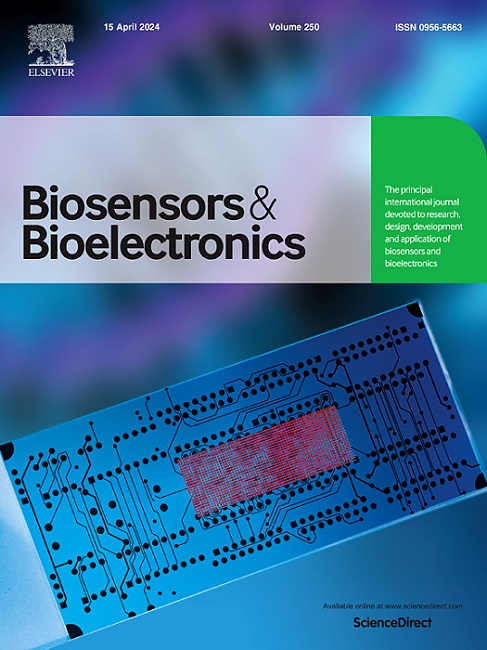利用基于 DNA 酶和智能手机辅助的电化学生物传感器快速直接检测 m6A 甲基化
IF 10.7
1区 生物学
Q1 BIOPHYSICS
引用次数: 0
摘要
m6A 甲基化检测对于了解 RNA 功能、揭示疾病机制、指导药物开发和推进表观遗传学研究至关重要。然而,高通量测序和基于液相色谱的传统方法在快速直接检测 m6A 甲基化方面仍面临挑战。在此,我们报告了一种基于 DNA 酶和智能手机辅助的快速检测 m6A 的电化学生物传感器。我们最初通过位点突变筛选确定了对 m6A 甲基化敏感的 DNA 酶突变体。然后将这些突变体与四面体 DNA 相结合,对电极进行修饰,形成了一个三维传感界面。利用 DNA 酶捕获并裂解 m6A 序列,实现了对 m6A 的检测。该电化学生物传感器能在纳摩尔浓度下检测到 m6A 序列,检测限低至 0.69 nM,60 分钟内的检测范围从 10 nM 到 104 nM。作为概念验证,我们选择了水稻的 3'-UTR 序列作为 m6A 分析物。结合智能手机,我们的生物传感器显示出良好的特异性、灵敏度和易操作性,这预示着它在 RNA 修饰检测和表观遗传分析领域的巨大前景。本文章由计算机程序翻译,如有差异,请以英文原文为准。
Rapid and direct detection of m6A methylation by DNAzyme-based and smartphone-assisted electrochemical biosensor
m6A methylation detection is crucial for understanding RNA functions, revealing disease mechanisms, guiding drug development and advancing epigenetics research. Nevertheless, high-throughput sequencing and liquid chromatography-based traditional methods still face challenges to rapid and direct detection of m6A methylation. Here we report a DNAzyme-based and smartphone-assisted electrochemical biosensor for rapid detection of m6A. We initially identified m6A methylation-sensitive DNAzyme mutants through site mutation screening. These mutants were then combined with tetrahedral DNA to modify the electrodes, creating a 3D sensing interface. The detection of m6A was accomplished by using DNAzyme to capture and cleave the m6A sequence. The electrochemical biosensor detected the m6A sequence at nanomolar concentrations with a low detection limit of 0.69 nM and a wide detection range from 10 to 104 nM within 60 min. As a proof of concept, the 3′-UTR sequence of rice was selected as the m6A analyte. Combined with a smartphone, our biosensor shows good specificity, sensitivity, and easy-to-perform features, which indicates great prospects in the field of RNA modification detection and epigenetic analysis.
求助全文
通过发布文献求助,成功后即可免费获取论文全文。
去求助
来源期刊

Biosensors and Bioelectronics
工程技术-电化学
CiteScore
20.80
自引率
7.10%
发文量
1006
审稿时长
29 days
期刊介绍:
Biosensors & Bioelectronics, along with its open access companion journal Biosensors & Bioelectronics: X, is the leading international publication in the field of biosensors and bioelectronics. It covers research, design, development, and application of biosensors, which are analytical devices incorporating biological materials with physicochemical transducers. These devices, including sensors, DNA chips, electronic noses, and lab-on-a-chip, produce digital signals proportional to specific analytes. Examples include immunosensors and enzyme-based biosensors, applied in various fields such as medicine, environmental monitoring, and food industry. The journal also focuses on molecular and supramolecular structures for enhancing device performance.
 求助内容:
求助内容: 应助结果提醒方式:
应助结果提醒方式:


